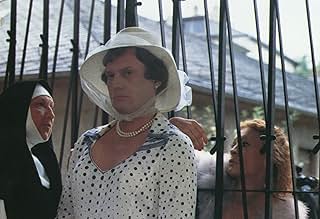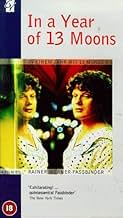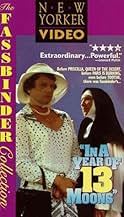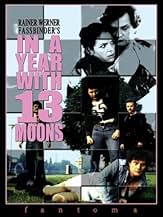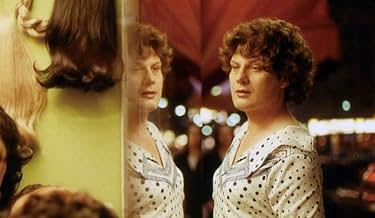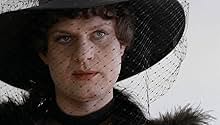IMDb RATING
7.3/10
5K
YOUR RATING
A transgender woman tries to salvage something from the wreckage love has made of her life by confronting her anguished past, hoping to find ultimate acceptance among former acquaintances an... Read allA transgender woman tries to salvage something from the wreckage love has made of her life by confronting her anguished past, hoping to find ultimate acceptance among former acquaintances and herself.A transgender woman tries to salvage something from the wreckage love has made of her life by confronting her anguished past, hoping to find ultimate acceptance among former acquaintances and herself.
- Director
- Writer
- Stars
- Awards
- 1 win total
Lilo Pempeit
- Schwester Gudrun
- (as Lieselotte Pempeit)
Janez Bermez
- Oskar Pleitgen
- (uncredited)
Rainer Werner Fassbinder
- Self
- (archive footage)
- (uncredited)
Günther Holzapfel
- Angestellter H. H. Brei
- (uncredited)
Ursula Lillig
- Putzfrau
- (uncredited)
Augusto Pinochet
- Self
- (archive footage)
- (uncredited)
- Director
- Writer
- All cast & crew
- Production, box office & more at IMDbPro
Featured reviews
This drama follows the last few days in the life of Elvira (formerly Erwin) Weisshaupt. Years before, Erwin told a co-worker, Anton, that he loved him. "Too bad, you aren't a woman," he replied. Erwin took Anton at his word. Trying to salvage something from the wreckage love has made of his life, he now hopes that Anton will not reject him again.
At this point (2017), I have seen most of what Fassbinder has made. And, indeed, the vast majority is really good. Some have said this is his best work. While I am not sure I am ready to jump on that train, I am also not willing to deny the possibility. Even the content alone deserves praise. This is 1978. I am no expert on transgender history, but I cannot think of any films that tackled such a heavy subject this far back.
If anything, the film seems even more topical today as transgender issues are more front and center. The mainstream is ready to stand up for the rights of these folks, and films like "13 Moons" should really be re-examined by the film community.
At this point (2017), I have seen most of what Fassbinder has made. And, indeed, the vast majority is really good. Some have said this is his best work. While I am not sure I am ready to jump on that train, I am also not willing to deny the possibility. Even the content alone deserves praise. This is 1978. I am no expert on transgender history, but I cannot think of any films that tackled such a heavy subject this far back.
If anything, the film seems even more topical today as transgender issues are more front and center. The mainstream is ready to stand up for the rights of these folks, and films like "13 Moons" should really be re-examined by the film community.
First of all, I would not call this a trans-or LGBT-themed film. Elvira, the main character, may have had trans surgery, but the plot makes it clear that they aren't a trans woman, that they made a mistake having the surgery. But it's also clear that the main character isn't a man, either-they are a person with a lack of identity. So it's a mistake to classify this one with the stories of trans men and women, it's about something very different.
Elvira's lack of identity surfaces in the fact that they can't remember their childhood at all, and when they search for details on it, the results are even more frustratingly ambiguous. They think that loving someone else gives them an identity, and it is this part of falling in love that they love the most-not so much being with another human being, but what it turns them into. That's why they undergo the surgery-because they think it will make them something when they are starting out as nothing. The surgery is just another turn of the screw for them-just another way of groping for an identity that isn't there. It's a much bleaker and more existential story than any trans-themed film I've ever seen.
The film leaves us with more questions than answers, which is how it should be. The characters speak in long monologues that raise lots of questions but no answers. They're more riddles than statements, and it's maddening. Maddening because the more Elvira searches for answers, the more they slip away from them. It's like a horrible taunt for Elvira, and we, in the audience, are not spared one moment of the terrible ambiguity of it all. Fassbinder's compositions add to the confusion, showing us a world that is as unclear to us as it is to Elvira.
For anyone going into this film looking for an LGBT story, you will be disappointed, as you will be if you like a story with a solid resolution. But for those who tolerate ambiguity and frustration-and, indeed, see how they can be virtues in art-you may well be dazzled and hypnotized.
Elvira's lack of identity surfaces in the fact that they can't remember their childhood at all, and when they search for details on it, the results are even more frustratingly ambiguous. They think that loving someone else gives them an identity, and it is this part of falling in love that they love the most-not so much being with another human being, but what it turns them into. That's why they undergo the surgery-because they think it will make them something when they are starting out as nothing. The surgery is just another turn of the screw for them-just another way of groping for an identity that isn't there. It's a much bleaker and more existential story than any trans-themed film I've ever seen.
The film leaves us with more questions than answers, which is how it should be. The characters speak in long monologues that raise lots of questions but no answers. They're more riddles than statements, and it's maddening. Maddening because the more Elvira searches for answers, the more they slip away from them. It's like a horrible taunt for Elvira, and we, in the audience, are not spared one moment of the terrible ambiguity of it all. Fassbinder's compositions add to the confusion, showing us a world that is as unclear to us as it is to Elvira.
For anyone going into this film looking for an LGBT story, you will be disappointed, as you will be if you like a story with a solid resolution. But for those who tolerate ambiguity and frustration-and, indeed, see how they can be virtues in art-you may well be dazzled and hypnotized.
As some others have written or implied this film is absolutely exhausting. It doesn't abandon its character or his life at any time although at times we almost WANT relief. Mahler's music in films has been dutifully noted. It can be almost as depressing in concert version. As for Nino Rota's "happy" music, or "life just continues (joyfully)" score, the irony isn't lost either. This is a one-man job and therefore takes risks that few producers or companies would tolerate under normal circumstances. I was profoundly moved by the film; I just don't plan to see it again for a while.
Curtis Stotlar
Curtis Stotlar
I have to save my comments for later...I began watching this film last night and, as disturbing as the slaughterhouse scene actually is, I was only able to make it halfway through. I will return. It amazes me when a film disturbs me so much that I cannot watch it in one sitting. I had similar reactions to both Pasolini's "Salo" and to Cronenberg's "Crash".
But I'm curious to learn from anyone who might have a clue why Nino Rota's theme music from "Amarcord" (original orchestration) was put in this movie's first half and yet isn't credited on IMDb's list of "combined details".
Anybody who might offer some insight on this omission....thanks for posting it here....
But I'm curious to learn from anyone who might have a clue why Nino Rota's theme music from "Amarcord" (original orchestration) was put in this movie's first half and yet isn't credited on IMDb's list of "combined details".
Anybody who might offer some insight on this omission....thanks for posting it here....
Fassbinder have have drilled the nail into the coffin of art film, forever establishing it as a genre in which only 1 person out of a thousand will actually like, enjoy, or want to study. One of those people happened to be my narrative avant-garde film proffessor. while this story of a man who switched genders...."just because" is deatheningly depressing and bloatedly long, there are redeeming qualities. This is appears to be a crystal clear message of struggle and love letter to the suffering of existence by Rainer Fassbinder, a homosexual who lived a short life and probably wrote this about an ex-boyfriend of his who committed suicide in his apartment.
The greatest moments in this film come when the storyline completely veers off center about 2/3 of the way through the film when we confront the bill gates-esque anton saitz, who has been a mythically obtuse figure up until this point. the director's wonderful gift for presenting the postmodern shows up first when elvira meets a man who mysteriously knows everything about anton s"ai"tz. "that's anton with a-i. that's the important thing" Next, we are treated to some wonderful dialogue between a suicidal janitor and Elvira which can only be described as highly surreal. Elvira reports the janitor's behavior to a hard-of-hearing secretary-like woman who may easily have been referenced in Being John Malkovich, who shrugs it off to look through a mysterious keyhole.
Apart from this, Fassbinder's film is heavy on human emotion, which is curious taken Fassbinder's philosophy that emotions are lies. surely, Elvira is not a character that the film itself is sympathetic with (this is not melodrama or 'boys don't cry'-like message sending), but one can sense the pain and confusion within her undoingdespite her being such a pathetic creature. so much so that it's difficult to even watch.
my love for the mid-section of big business is also unfortunately my source of dismay at this movie. it's violently uneven. and i have a hard time with film directors who can get away with this 'avant-garde' crap by taking simply playing around with the medium, wherein with any other form (literature, poetry, television, music) that jumping around would just seem like you didn't know what you're doing.
In the Year of 13 Moons is a wonderful movie for study, but it's not for enjoyment or amusement- as with so many films that have followed it.
The greatest moments in this film come when the storyline completely veers off center about 2/3 of the way through the film when we confront the bill gates-esque anton saitz, who has been a mythically obtuse figure up until this point. the director's wonderful gift for presenting the postmodern shows up first when elvira meets a man who mysteriously knows everything about anton s"ai"tz. "that's anton with a-i. that's the important thing" Next, we are treated to some wonderful dialogue between a suicidal janitor and Elvira which can only be described as highly surreal. Elvira reports the janitor's behavior to a hard-of-hearing secretary-like woman who may easily have been referenced in Being John Malkovich, who shrugs it off to look through a mysterious keyhole.
Apart from this, Fassbinder's film is heavy on human emotion, which is curious taken Fassbinder's philosophy that emotions are lies. surely, Elvira is not a character that the film itself is sympathetic with (this is not melodrama or 'boys don't cry'-like message sending), but one can sense the pain and confusion within her undoingdespite her being such a pathetic creature. so much so that it's difficult to even watch.
my love for the mid-section of big business is also unfortunately my source of dismay at this movie. it's violently uneven. and i have a hard time with film directors who can get away with this 'avant-garde' crap by taking simply playing around with the medium, wherein with any other form (literature, poetry, television, music) that jumping around would just seem like you didn't know what you're doing.
In the Year of 13 Moons is a wonderful movie for study, but it's not for enjoyment or amusement- as with so many films that have followed it.
Did you know
- TriviaThe tape-recorded narration heard throughout the film (particularly during the final scene) was not scripted. Volker Spengler (playing Elvira Weishaupt) and Rainer Werner Fassbinder recorded the narration together, with Fassbinder asking questions and Spengler responding in character. In the final cut of the film, Fassbinder's voice is edited out.
- SoundtracksSchöner fremder Mann
Music and Words by Athena Hosey and Hal Gordon and German lyrics by Camillo Felgen
Performed by Connie Francis
- How long is In a Year with 13 Moons?Powered by Alexa
Details
- Release date
- Country of origin
- Language
- Also known as
- In a Year with 13 Moons
- Filming locations
- Production companies
- See more company credits at IMDbPro
Box office
- Budget
- DEM 700,000 (estimated)
- Runtime2 hours 4 minutes
- Sound mix
- Aspect ratio
- 1.66 : 1
Contribute to this page
Suggest an edit or add missing content

Top Gap
By what name was L'année des treize lunes (1978) officially released in India in English?
Answer
